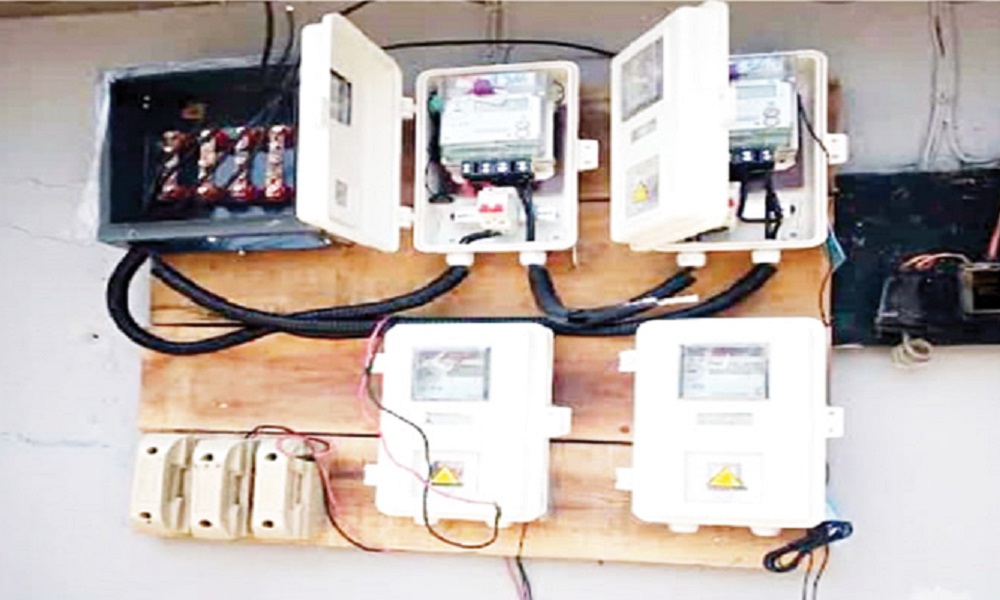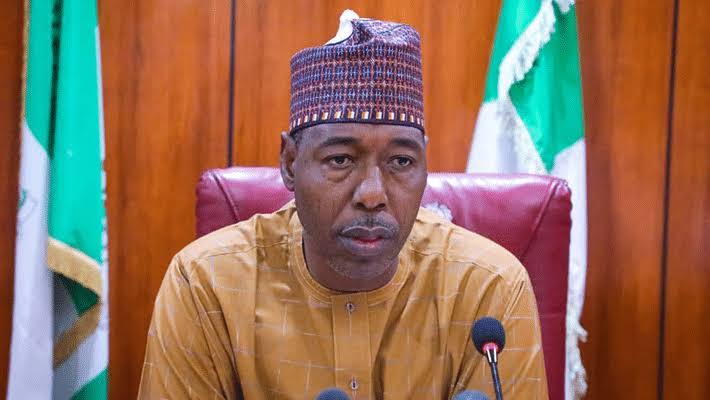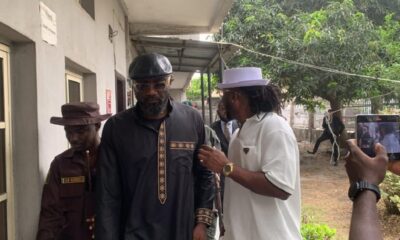News
FG to provide free meters with N700bn

The Federal Government has set aside N700 billion to implement the distribution of free electricity meters under the Presidential Metering Initiative.
The amount being deducted from the monthly federation revenue before allocation to the three tiers of government is designed to resolve the metering gap which currently stands at 50 per cent.
An analysis of the Federal Account Allocation Committee meeting minutes obtained by our correspondent between April and August showed that the government has saved N420bn from a monthly deduction of N100bn.
Recall that N120bn was deducted from April revenue as the first tranche of the PMI.
This means a total of N420bn has been deducted from the federation account for this initiative.
In May this year, the Minister of Power, Adebayo Adelabu, said the government would provide an initial N75bn as seed capital, while the Nigerian Sovereign Investment Authority pledged to inject a minimum of N250bn annually for the initiative’s duration.
Adelabu also disclosed that the initiative would leverage debt financing from diverse financial institutions to bolster the PMI’s resources.
The Managing Director of Abuja Distribution Electricity Distribution Company, Victor Ojelabi, recently said that the PMI would unlock about N1tn in revenue currently tied up in the Nigerian Electricity Supply Industry due to a large number of unmetered customers.
Under the initiative, the Nigerian Electricity Regulatory Commission announced the approval of N21bn for the 11 electricity Distribution Companies to provide meters for end-use customers at zero cost.
Providing an update on the issue in an interview with Saturday PUNCH on Friday, the Special Adviser to the Minister of Power on Strategic Communications and Media, Bolaji Tunji, affirmed that the programme was still on course with a target to deliver two million meters yearly.
Tunji revealed that the amount saved had reached N700bn, adding that procurement had started.
He said, “The Presidential Metering Initiative is still on course, two million meters every year, delivery of the first batch will start by the first quarter of next year. About N700bn provision has been made, and the money is ready.”
Tunji further revealed that the government would fulfil its promise to deliver 1.3 million out of the 3.2 million meters under the World Bank Distribution Sector Reform Programme initiative this month.
News
Zulum orders arrest, offers house, scholarship to abused boy in viral video

Borno State governor, Babagana Umara Zulum, has ordered the immediate arrest and prosecution of one Bukar Modu, who was seen allegedly molesting a minor, Bashir Gaji, in a viral video that has sparked outrage on social media.
Security operatives arrested Modu on Saturday night in Umarari, Maiduguri, following the governor’s directive.
Governor Zulum met with the victim, little Bashir Gaji, on Sunday at the Government House in Maiduguri.
During the meeting, the governor condemned the incident in strong terms, saying, “This heinous act is an affront on our values and a betrayal of our duty to protect our children, students and minors who are under our guardianship,” Zulum said.
“We cannot tolerate such actions perpetually repeating itself. I am directing the relevant authorities to move swiftly and ensure that this individual faces the full extent of the law. Our children deserve a safe environment to grow and become meaningful members of society.”
He also directed the Ministry of Women Affairs and Social Development to develop strategies for enhanced community sensitisation.
The aim is to educate families, traditional teachers, and guardians on proper, non-abusive ways of disciplining children.
As part of efforts to support the victim, Governor Zulum announced that the government would provide a fully furnished house for Gaji’s family and also award the child a scholarship to cover his education.
According to reports, the boy and his family currently reside in an Internally Displaced Persons (IDP) camp in Monguno Local Government Area after his father was killed by Boko Haram insurgents.
News
Oluwo raises alarm over brewing Osun-Oyo border dispute

The Oluwo of Iwo, Oba Abdulrosheed Akanbi, has raised alarm over a looming interstate conflict between Osun and Oyo States stemming from a long-standing land dispute.
In a statement issued on Sunday night, the monarch called on Osun State Governor, Senator Ademola Adeleke, and his Oyo State counterpart, Governor Seyi Makinde, to urgently harmonize stakeholder interests to prevent a potential clash.
Oba Akanbi pointed to rising tensions between residents of the Oke Oba axis of Iwoland (Osun State) and the Lagelu area of Ibadan (Oyo State), describing the situation as a brewing territorial crisis.
He noted that the dispute has been under the purview of the National Boundary Commission for years, with a comprehensive report already prepared and awaiting public presentation, pending facilitation by both state governors.
The Oluwo accused individuals from the Lagelu area of illegal land grabbing, claiming they have been forcefully taking over land and attacking villagers in several Iwoland communities, including Ogunajo, Eleye, Molamu, Paku, Ejemu Oja, Oloya, Arikese, Eleweran, Olofa Ogundiran, and Molafe.
He urged the two governors to consult the clearly defined boundary map established in 1991 when Osun State was carved out of the old Oyo State.
“As a peace-loving Royal Father,” Oba Akanbi stated, “I appeal to the Governors of Osun and Oyo States, Senator Nurudeen Jackson Ademola Adeleke and Engr. Seyi Makinde respectively, to harmonize their interests in resolving the long-standing boundary dispute between the people of Oke Oba Papa Axis of Iwoland and the Lagelu area of Ibadan.”
“Just yesterday, these land grabbers from Lagelu mobilized again for an onslaught against the people of Oke Oba villages in Iwoland. They have committed arson by destroying both public and private properties. They have sacked teachers and students from classrooms. I feared further silence may degenerate into a larger event if not timely curtailed.
“The palaces of some Baales were completely destroyed. Oloola Molamu Oyin was razed last week. Osun has District Council Primary school and maternity there. The people of these villages have Osun State polling units during elections. They have removed the roof of all these government facilities. They removed the roof, loot and set ablaze the palace. They took Over people’s farms, harvested their goods and rubbed them at gunpoint. They have their thugs stationed at these villages till date with guns and other deadly weapons.”
News
UN deputy secretary general, others storm UK for Chibok girls

United Nations (UN) Deputy Secretary-General, Amina Mohammed, Emir of Kano, Emir Muhammadu Sanusi II and Chief Operation Officer (COO), Murtala Muhammed Foundation (MMF), Dr. Aisha Muhammed-Oyebode, will today join other global speakers at the 11th year programme of the Chibok Girls abduction, with photo exhibition and commemoration in London, the United Kingdom.
The event with the theme: “A Decade On: Chibok Photo Exhibition and Commemoration”, will hold at SOAS, University of London, in the UK.
Dr. Muhammed-Oyebode, in a statement yesterday, said she would lead global panellists in a discussion titled: “The Stolen Daughters of Chibok: Resilience, Justice and Global Lessons”.
It will also feature photo exhibition, bringing together global leaders, scholars and advocates to reflect on the enduring tragedy and its impact on education, gender and conflict recovery.
Muhammed-Oyebode, whose advocacy has been instrumental in keeping the Chibok narrative alive, will open the session with remarks contextualising the ongoing plight of the girls and the communities affected by insurgency in Nigeria.
She said: “This isn’t just history – this is a continuing horror. We gather not only to honour the stolen daughters of Chibok, but also to hold the world accountable for allowing impunity to thrive, while generations of girls are silenced by violence.
“The programme will include contributions from UN Deputy Secretary-General, Amina Mohammed, Bulama Bukarti, Osai Ojigho and Dr. Elizabeth Pearson, with an address from Emir Muhammadu Sanusi II, who serves as the honorary patron of the accompanying photo exhibition.’’
-

 News20 hours ago
News20 hours agoFire engulfs presidential villa
-

 News15 hours ago
News15 hours agoTinubu’s ugly past shores up as US Judge orders DEA, FBI to release files
-

 News20 hours ago
News20 hours agoBig waste! Man with PhD in Maths works as cleaner, messenger in Nigerian University
-

 Sports14 hours ago
Sports14 hours agoJust in: Newcastle pummel Man United 4-1
-

 Education20 hours ago
Education20 hours agoJAMB releases 2025 mock UTME results
-

 News3 hours ago
News3 hours agoAutonomy: 774 LGs challenge FG, states in court Tuesday
-

 News14 hours ago
News14 hours ago2027: Atiku’s Opposition Front is a mission impossible-Wike declares
-

 Economy19 hours ago
Economy19 hours agoSEE Current Black Market Dollar (USD) To Naira (NGN) Exchange Rate

















